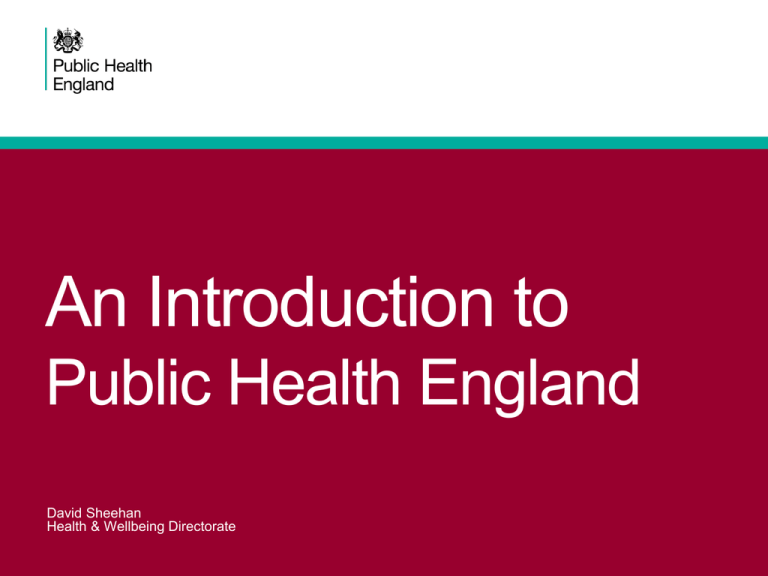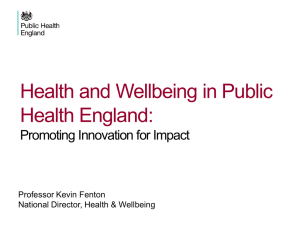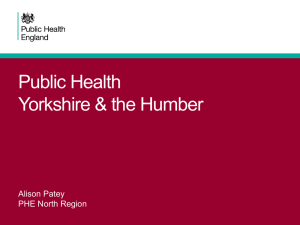An Introduction to Public Health England
advertisement

An Introduction to Public Health England David Sheehan Health & Wellbeing Directorate Directorate for Health and Wellbeing Overview 1. Public Health England 2. What do we do? 3. How will we do our work? 4. Where will we focus our efforts? 5. How can we be fit for purpose? 6. Summary 2 Going Live Event: Health and Wellbeing directorate working together 3 Public Health England • Public Health England is the authoritative leader in national public health and the expert service provider for public health in England • Public Health England’s mission is to work with and alongside others to protect and improve the public’s health and well-being and reduce inequalities through our advocacy; application of knowledge, evidence and insight; transparent reporting of outcomes; and nurturing the public health system and workforce Introduction to Public Health England Organisational Structure 4 Presentation title - edit in Header and Footer Regional focus – 4 Regions, 15 Centres – Eight Knowledge and Intelligence Hubs – – – – – – – London South West South East West Midlands East Midlands North West North East, Yorkshire and the Humber – East – Other local presence – ten microbiology laboratories – field epidemiology teams – Centre for Radiation Control units 5 Introduction to Public Health England 6 Local Authorities • Local Authorities, with detailed understanding of their communities and circumstances are the natural leaders for public health in their areas. Public Health England will support them with knowledge and expertise to help them deliver on their responsibilities • PHE is structured into four regions and fifteen centres spread across the country. The centres are key to the interaction with local authorities Introduction to Public Health England Sources of public health advice in the ‘Placebased’ approach to local public health 3rd sector providers People and communities NHS & IS Providers Health and wellbeing boards PHE centre Local government Public health advice Commissioner of public health services CCGs & their support NHS England Local Area Team Leverage from the public health ring fence Influence on wider spending in commercial and voluntary sectors DsPH have influence across all local government spend PHE provides expert advice to local government PHE provides expertise in local area teams Clinical Commissioning Groups and Embedding ‘making every contact count’ 9 Partnerships will be key • Public Health England cannot succeed by itself. Our partnerships with local authorities, the NHS and the third sector are what will allow us to achieve the outcomes we want. • Our partners provide broader avenues by which the public interact with the health system and may be advocates for public health. PHE will work with and support our partners to ensure the best outcomes. Introduction to Public Health England 10 What do we do? Our work saves lives, promotes wellbeing and creates environments that enable individuals, families, and communities be informed, empowered, healthier and more productive. The Health and Wellbeing Directorate Deliver Accelerate Public Health Outcomes Engage Our integrated approach Public Education and Empowerment Support Public Health Workforce Capacity Champion The directorate will use an integrated approach working with a range of partners to support the development, implementation and scale up of robust, effective population health programs and to address the social determinants of health 11 Scale High Impact Interventions Partner Tackle Health Inequities The Health and Wellbeing Directorate Support local government, voluntary sector, the NHS and other partners in their mission to align activities and promote improved outcomes for the public’s health and well being and to reduce health inequities Inform, educate, and empower the public and communities nationwide, especially those in greatest need, to take better control of health, their determinants and outcomes Support the development of a robust public health workforce who are knowledgeable, capable, passionate and effective in improving health, promoting wellness, and addressing health inequities Champion science and translational research to inform the development, implementation, and scale-up of high-impact evidence-based strategies to improve public health outcomes Engage multisectoral partnerships, including with other government departments, to focus on and address health inequities and to tackle the social determinants of health 12 Where do we focus our efforts? We will focus on the major drivers of disease, disability, disadvantage and death and tackle health inequalities. The Health and Wellbeing Directorate Global Burden of Diseases, Injuries and Risk Factors Study 2010 • The Global Burden of Disease Study 2010 (GBD 2010) is a collaborative project of nearly 500 researchers in 50 countries led by the Institute for Health Metrics and Evaluation (IHME) at the University of Washington. • It is the largest systematic scientific effort in history to quantify levels and trends of health loss due to diseases, injuries, and risk factors. GBD serves as a global public good to inform evidence-based policymaking and health systems design. UK OVERVIEW • In terms of the number of years of life lost (YLLs) due to premature death in the United Kingdom, ischemic heart disease, lung cancers, and cerebrovascular disease were the highest ranking causes in 2010. • Of the 25 most important causes of burden, as measured by disability adjusted life years (DALYs), ischemic heart disease showed the largest decrease, falling by 50% from 1990 to 2010. • The leading risk factor in the United Kingdom is dietary risks. 13 http://www.healthmetricsandevaluation.org; The Lancet, Early Online Publication, 5 March 2013doi:10.1016/S0140-6736(13)60355-4 Where do we focus our efforts? 14 http://www.healthmetricsandevaluation.org Where do we focus our efforts? 15 http://www.healthmetricsandevaluation.org; The Lancet, Early Online Publication, 5 March 2013doi:10.1016/S0140-6736(13)60355-4 Where do we focus our efforts? Overall, the three risk factors that account for the most disease burden in the United Kingdom are dietary risks, tobacco smoking, and high blood pressure. The leading risk factor for both children under 5 and adults aged 15-49 years was tobacco smoking in 2010. Tobacco smoking as a risk factor for children is due to second-hand smoke exposure. 16 http://www.healthmetricsandevaluation.org; The Lancet, Early Online Publication, 5 March 2013doi:10.1016/S0140-6736(13)60355-4 Health Impact Priorities Health and Wellbeing Directorate Well being and Mental Health Health and Wellbeing Directorate Health Impact Priorities While supporting and ensuring progress against the PHOF, the Directorate will provide enhanced focus on the major drivers of mortality and morbidity in England where further gains may be made by scaling known, effective strategies Diet, Obesity, and Physical Exercise Tobacco Control and Smoking Cessation Alcohol Moderation and Drug Recovery HIV and Sexual health Mental disorder accounts for largest burden (23%) of diseases in England and affects >1 in 4 of the population at any time Mental wellbeing assoc with improved outcomes in health, education, employment, reduced crime and antisocial behaviour Public mental health: Better assessment; interventions; prioritization All major causes of CVD and cancer. Poor diet accounts for one third of deaths from cancer and CVD. Low levels of physical activity increases the risk CVD, colorectal and breast cancer by 20-35%. Obesity increases risk of type II diabetes (5-13 times), hypertension (2-3 times) and colorectal cancer (3 times) in men. Accounts for 20% of new cases of cancer (23%M and16%F) Tobacco causes nearly 1 in 5 deaths in England annually For each death, 20 more suffer tobacco-related illnesses Comprehensive cessation programs; excise tax increases; 100% smoke-free policies; media campaigns; cessation access; advertising restrictions work. Much of the cost of drug and alcohol misuse occurs to the criminal justice system. The main costs to society from drug an alcohol is from related crime. This is different to other lifestyle health related areas and needs a different public health response. By the end of 2012 likely more than 100,000 PLWHA in the UK Late diagnosis a major problem with 50% diagnosed with CD4<350 Millions of STD diagnosed annually, esp. among youth, MSM, minorities HIV/STD screening, early treatment, partner notification, social marketing campaigns, condom access, and policy to address stigma and discrimination are key interventions Healthy Infants, Children, and Young Adults Life course perspective Expert advisors will assist PHE technical leads to develop, implement and monitor population health, and health and wellness across the lifespan in five domains. They will also assist PHE in promoting the value and impact of this approach to our partners and stakeholders. 18 A focus on improving health and health outcomes for mothers and infants, children, teens and young adults. Healthy Adults and Older Adults All people, and especially those at greater risk of health disparities, will achieve their optimal lifespan with the best possible quality of health, including mental health, in every stage of life. Healthcare Public Health Support sound decision-making and policy change within the NHS to deliver, scale up, evaluate and improve effective clinical preventive services that drive population health. Healthy People in Healthy Places Health in All Policies Ensuring that the places where people live, work, learn, and play will protect and promote their health, especially those people at greater risk of health disparities. Inform and support DH and other government partners in sound decision-making and policy change at all levels to deliver and evaluate programmes and address social determinants of health. Regional Going Live Event: Health and Wellbeing directorate working together Functional Design Health and Wellbeing Directorate National Director, Health and Wellbeing Planning Partnership Performance Programme Improvement and Delivery Population and Behavioural Health Health Impact Priorities Coordinator National Cancer Screening Programme Infants, Children, Youth Team Executive Secretariat National Screening Programme Adult Health & Wellbeing Team Healthcare Public Health Programme Nutrition & Healthy Food Programme Dental Public Health Programme Drugs and Alcohol Programme D Strategic Partnerships Health in All Policies Performance Monitoring/ Reporting Embedded Business Manager Operations and Management Offender Health Programme National & Local Authority Capacity Building Team Health Equity and Impact Social Determinants & Inequalities Team Healthy People in Health Places Health Marketing and Public Engagement Campaigns Team Behavioural Insight Translation Team Workplace Wellbeing Programme Healthy Communities and Sustainable Development Accidents, Injury and Violence Digital/ Social Media Team Public Mental Health Team NHS Healthcheck Team Public & Community Engagement Internal Communications Life Course Approach / Health Impact Priorities Science and Strategic Information Behavioural Insight Research Team Professional Editor Academic Partnerships, Training Embedded Scientific support from K&I Econometric Analysis/Evaluati on Statistics and Data Management 20 Promoting innovation for impact The Health and Wellbeing directorate will: • Support the development and delivery of high-quality, effective, evidencebased prevention programmes • Use new technologies, including digital and social media, to engage and empower individuals, communities and our partners about health and wellbeing • Build capacity in important areas including public mental health, population healthcare, accidents injuries and violence • Work with diverse partners to encourage settings-based approaches to health and wellbeing, in addition to promoting health across the lifespan • Integrate insights from behavioural science to improve the effectiveness, efficiency, and acceptability of our programmes Regional Going Live Event: Health and Wellbeing directorate working together








